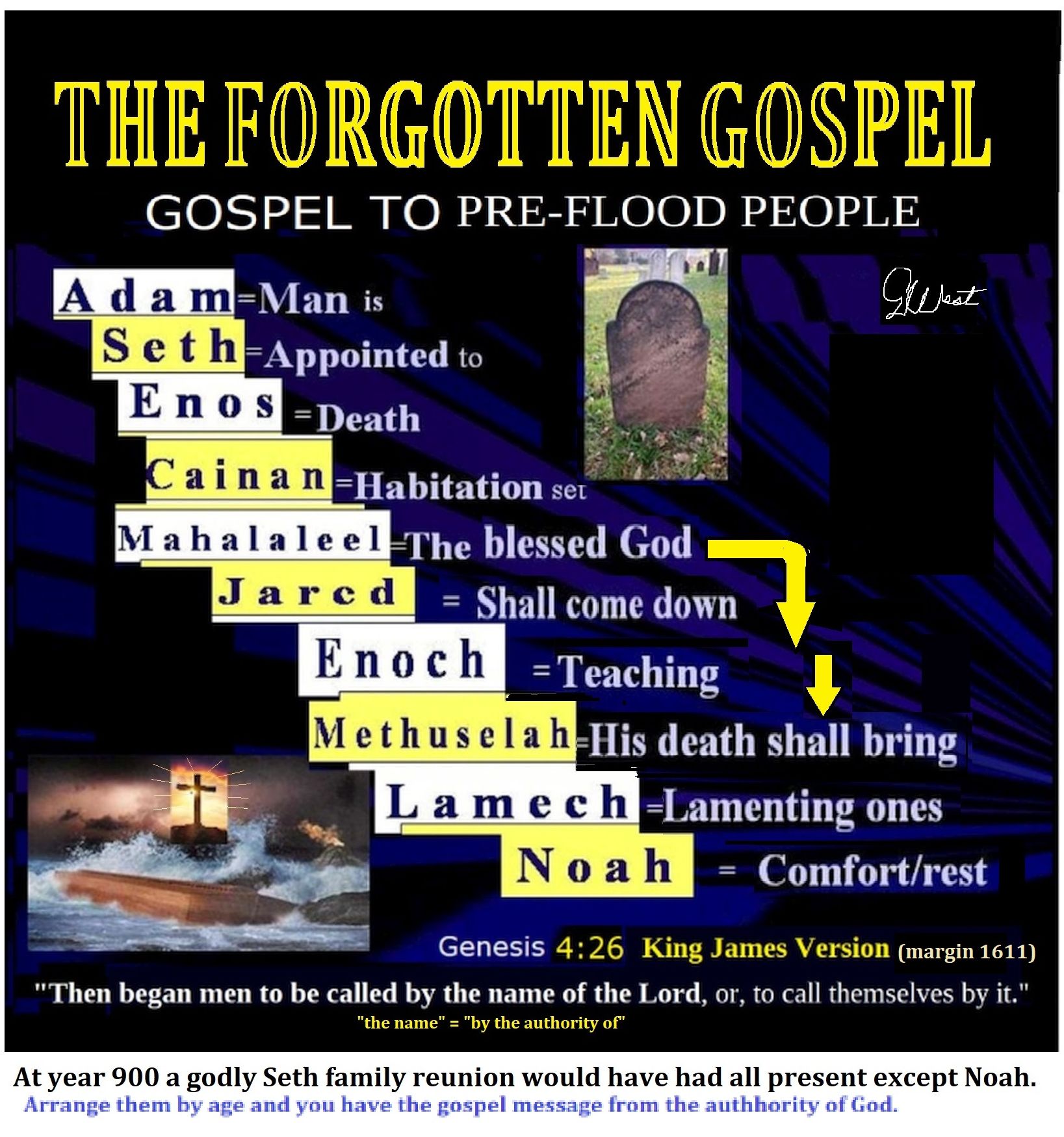Listed under (above) "ARTICLES."

Reference for a quick timeline. i
The first four books of the New Testament are sometimes prefaced with “the gospel according to.” The word “gospel” means “good news.” The good news is that Jesus came down teaching, died, was buried, and arose in order that man might be saved eternally. That is the message of the New Testament but it is also the Heavenly message of Genesis 5.
While going over some early American pioneer sermons, I was somewhat enthralled with the sermon based on the real meaning of Genesis 4 and 5 and one of its chief signifance for us today. These chapters incidentally precede the coming flood.
The optional (marginal) readingii for Genesis 4:26 is what we are considering: “Then began men to call themselves by the name (defined as “authority” Strong’s H8034) of the Lord.”iii That definition is important. It is the Hebrew expression and its Greek equivalent expression in the New Testament (e.g., “in the name G3686 of Christ”). It means the same thing: in or by an authority. We are baptized in the name of Christ; that is, by Christ's authority (Acts 2:38). This explanation precedes the Seth genealogy listing in Genesis 5. Therefore, we can conclude that just as God authorized Abram's and Sarai’s names changed (to Abraham and Sarah; Genesis 17:5; 16) He authorized the names applied in Genesis 5. These names constitute a message from God.
The list of names taken together in sequence outlines God’s eternal plan to die Himself for mankind. For according to Ephesians 1:4, the gospel of Christ had been planned from “before the foundation of the world.” Therefore, Our Omniscient God foreknew that we would need a Savior: Him. God reveals in Genesis 5’s genealogy that not only would the woman participate in defeating Satan (Genesis 3:15) but that God was involving Himself directly in the saving of mankind.

“And he called his (son’s) name Enos.” Enosh, "man" (Gesenius's Hebrew and Chaldee Lexicon); "mortal, decaying man" (Furst's Concordance); "mortal man; sick; despaired of; forgetful" (https://classic.net.bible.org/dictionary.php?word=ENOSH). Genesis 4:26’s preface states that Enosh’s name was authorized by God as were the other names of Enosh's lineage.
This gospel summary becomes “man is dying but the blessed God will come down to teach and to die for mankind in order to provide peace and safety.” Number 1, man is dying; number 2, God is coming to earth; number 3, He’s to teach us; number 4, He’s to die for us; number 5, God is the answer to man’s hope and peace. God will confirm this to us by the saving of Noah from the flood. This reading confirms that Jesus is God (John 1:1) for who else fulfils this authorized prophecy?
An added bonus for accepting the marginal reading of 4:26 is the solving of the controversies over Genesis 6. There should be no doubt then who the children of God of Genesis 6 are (i.e., “sons of God” in Genesis 6). They are the family kin of Genesis 5. Their fall precipitated the destruction of the world that then was (2 Peter 3:6). God would have saved Sodom if there had been at least 10 righteous souls there (Genesis 18).
IN SUMMARY: The Antediluvians began with direct contact with our Creator. The fall from the Garden began to change things. However, according to Genesis 4- 6 the line of Enoch to Noah KEPT THEM in touch with God. At any rate, the family names would have reminded them with a "hope" message from God to mankind. Adam's death should have awaken them to the lie that the Serpent had told "of not dying" while the prophetic names should have encouraged them to be faithful.
The controversial interpretation of chapter 6's "gods" and "giants" is resolved in my judgment if we accept the alternate translation of 4:26. The marginal reading for the King James Version combined with the genealogical Hebrew names' definitions, makes better sense. That it should mean that mankind in general began to blasphene God’s name by "profaning it" (as somee teach it) is uncalled for. It does not fit the immediate context. The names in chapter 5 give the gospel story.”
-- Gaylon West 2024 Throw Out The Lifeline
i Timeline: https://i0.wp.com/www.josephineelia.com/wp-content/uploads/2011/03/timeline.jpg?ss1`=1
ii GW: I understand and appreciate the importance of the translators’ marginal notes for the King James Version of the Bible. The ancient Hebrew is sometimes difficult to translate and the translators wanted the reader to understand this. Below is the source for the significance of King James translators’ notes; e.g.,
“Ways in which the margin notes are useful:
The margin notes shed light on obscure passages
The meaning of the names of Bible characters is often of interest
The meaning of some biblical terms are defined (such as Bethel, meaning house of God)”; etc. -- https://thekingsbible.com/Library/MarginNotes
iii “When God changed a person’s name and gave him a new name, it was usually to establish a new identity. God changed Abram’s name, meaning "high father," to “Abraham,” meaning "father of a multitude" (Genesis 17:5). At the same time, God changed Abraham’s wife’s name from “Sarai,” meaning “my princess,” to “Sarah,” meaning “mother of nations” (Genesis 17:15). This name change took place when God gave Abraham the covenant of circumcision.
